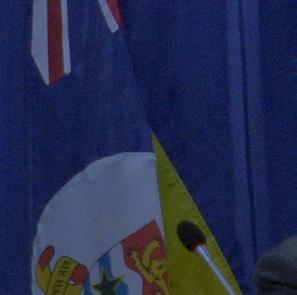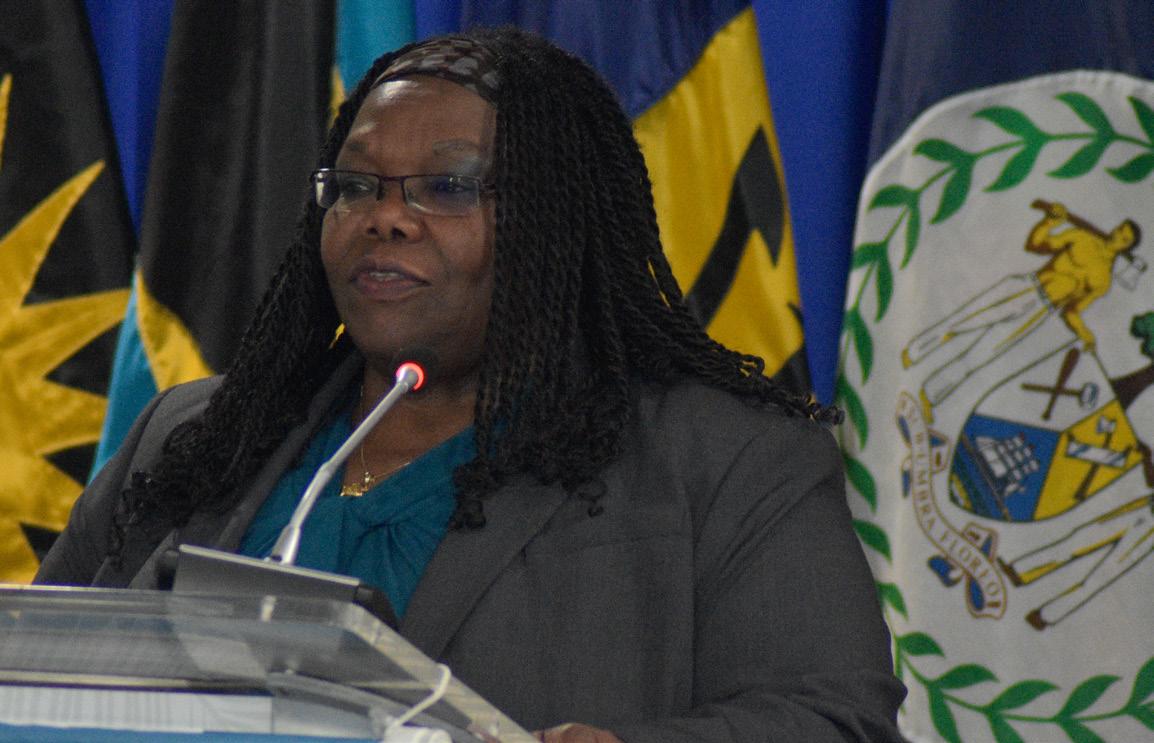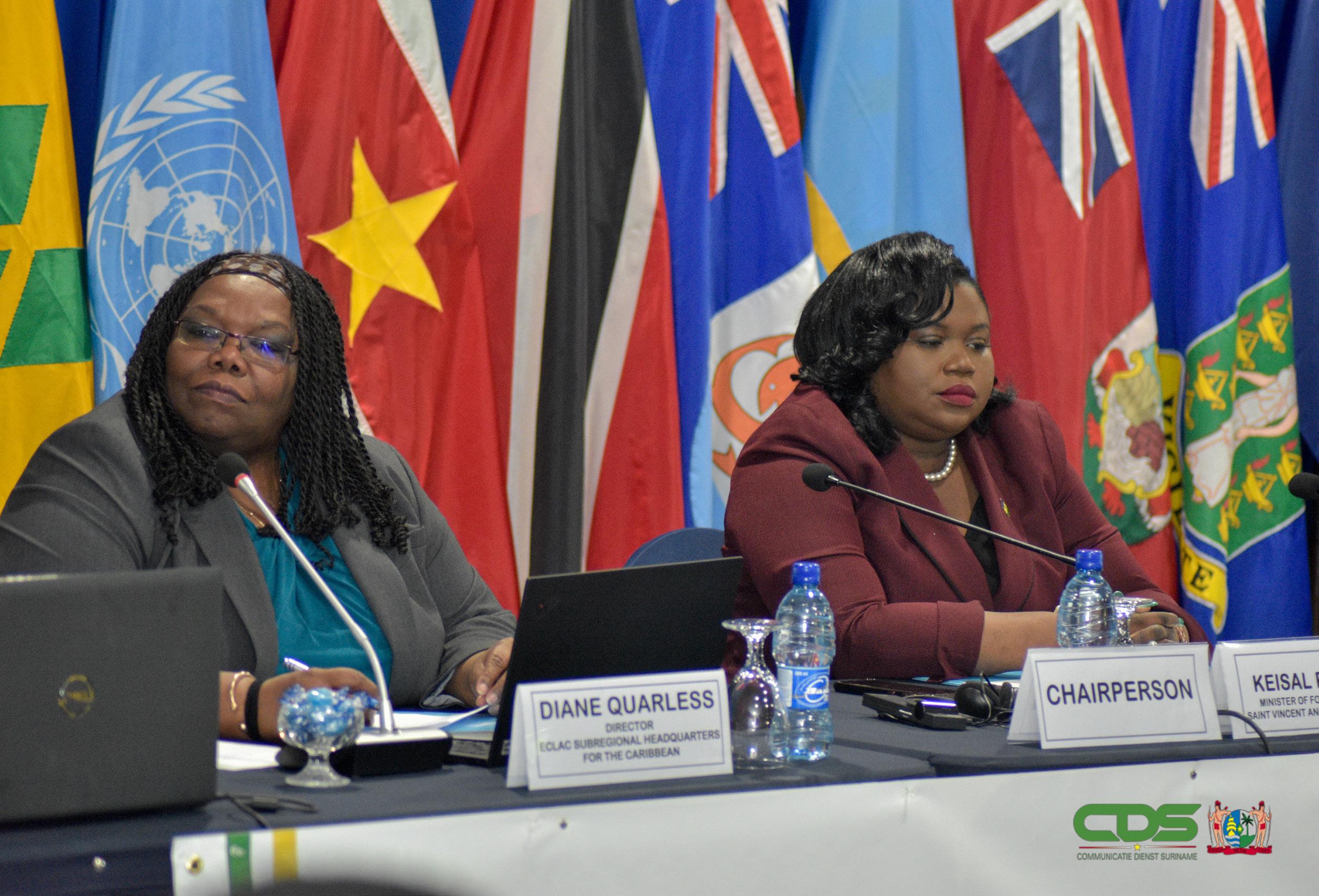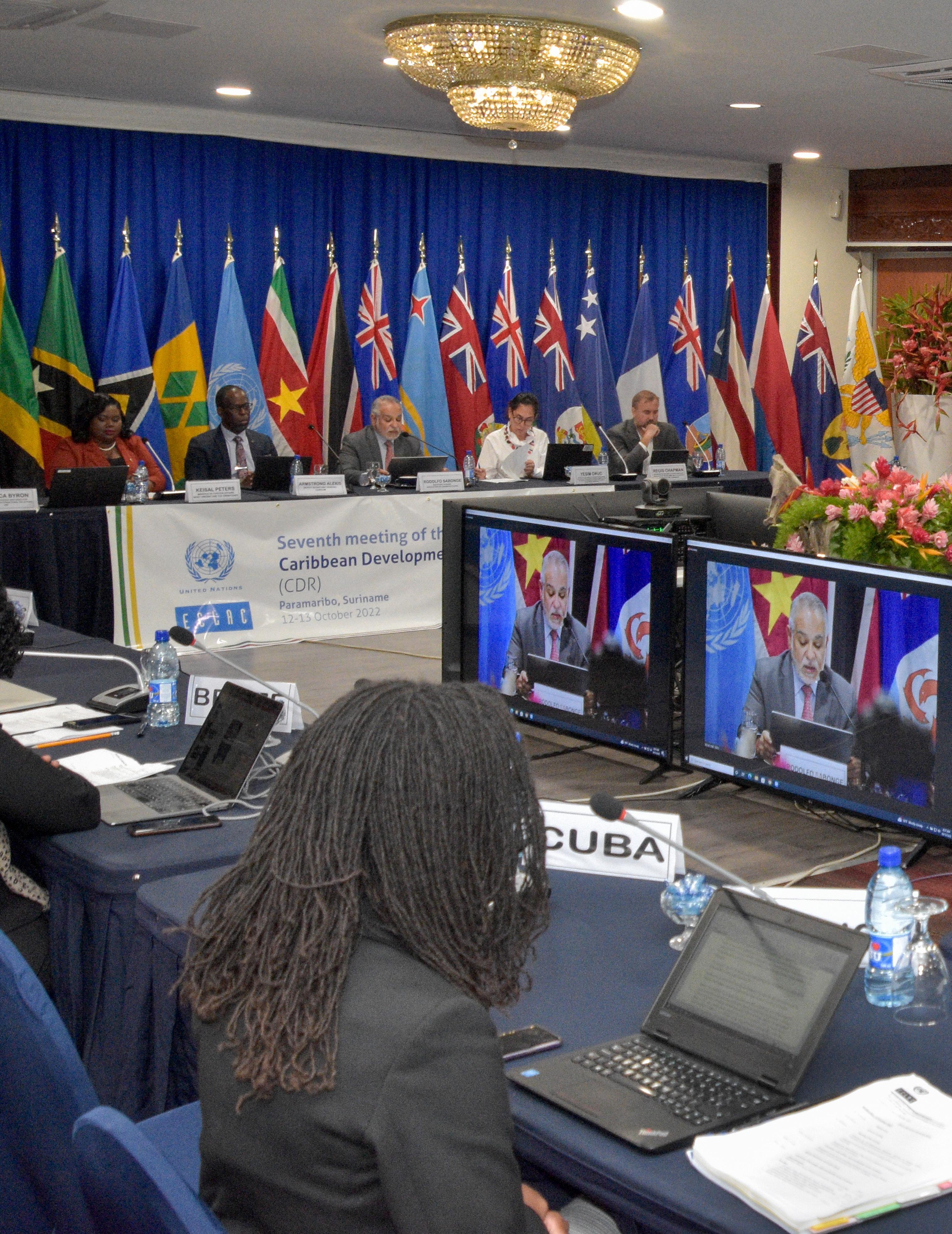IN THIS special issue








































SURINAME ASSUMES CHAIR OF THE CDCC













CDR SETS THE TONE FOR DISCUSSIONS ON POST COVID-19

Volume 9 - Issue 10
How well do you know Suriname? A HUMMINGBIRD FEATURE: Suriname assumes chair of the Caribbean Development and Cooperation Committee



About us
Issued on a monthly basis, The Hummingbird offers insights into the latest projects, publications, technical assistance missions and research carried out by ECLAC Caribbean. In addition to these, sneak previews are provided of the most salient upcoming events, alongside enriching followups to previously covered issues. With a view to featuring a variety of facets of Caribbean life and lifestyle, The Hummingbird also zooms in on cultural activities and landmark occurrences through an eye-opening regional round-up.
EDITORIAL TEAM
Editor: Johann Brathwaite
Copy Editor: Denise Balgobin
Proof Reader: Veera Deokiesingh-Fraser
Publication Design: Liseanne Martin-Subero
Please see our contact details on the back cover of this magazine.
ECLAC Caribbean 2021 Work Programme implementation Resolutions Adopted in 2022 Caribbean Development Roundtable sets the tone for discussions on post COVID-19 Seventh Caribbean Development Roundtable 4 8 14 16 20 24 22 13 11
International Days
10 November
World Science Day for Peace and Development
14 November
World Diabetes Day
21 November
World Day of Remembrance for Road Traffic Victims
25 November
International Day for the Elimination of Violence against Women

Upcoming Meetings

22 NOVEMBER 2022
Addressing coordination and data sharing challenges for better environment, climate change and disaster indicators
13 DECEMBER 2022
Workshop on the Preparation of Reports for the 10-Year Review of SAMOA Pathway
15 DECEMBER 2022
Workshop on Measuring Digital Inclusion in the Caribbean

how well do you know Suriname?
OFFICIAL NAME: Republic of Suriname
CAPITAL CITY: Paramaribo
POPULATION: 609,569
AREA: 163,820 sq km
MAJOR LANGUAGES: Dutch, English, Sranang Tongo, Caribbean Hindustani, Javanese
The British once controlled parts of Suriname but in 1667, they swapped their share with the Netherlands in exchange for New Amsterdam –which would become New York City.
The country was once known as Dutch Guiana. In 1954 it was given full autonomy and in 1975 the country finally became independent of Holland.
The Surinamese flag was adopted in 1975. Its centre depicts a yellow star symbolizing the unity of the country, its golden future and the spirit of sacrifice required to achieve its goals. Behind the star, the green stripes denote the country’s jungles and agricultural land; the white represent justice and freedom and the red embody the progressive spirit of the young country.
Suriname was initially inhabited by peoples including the Arawak, the Carib and the Surinen – from whom the country’s name descends.
In 1498, Christopher Columbus was the first European to sight the coast of Suriname.
In 1593 Spanish explorers visited the region and named it Suriname after the Surinen people.
Desi Bouterse led Suriname through the 1980s as head of a military government. He regained office in 2010 through elections, was reelected in 2015 and served until May 2020.
In July 2020, a coalition government led by Chandrikapersad Santokhi was installed. Santokhi promised to tackle COVID-19, the economic crisis it inherited, and corruption.
 1.
4.
5.
6.
7.
8.
2.
3.
1.
4.
5.
6.
7.
8.
2.
3.
4|The Hummingbird
Suriname is the smallest independent country in South America in terms of land size. French Guiana is smaller, but it is an overseas department of France.
Around four-fifths (80%) of the country is tropical rainforest.
The main export of Suriname is gold. At $1.81 billion it accounts for 67 per cent of the country’s total exports. The discovery of oil was first announced in January 2020, and there is an expectation the country will become a major oil producer in the CARICOM region in the near future.

Suriname has two UNESCO World Heritage Sites: the Central Suriname Nature Reserve and the Historic Inner City of Paramaribo.
The Central Suriname Nature Reserve, at 16,000 sq km, covers around 11 per cent of Suriname’s land area and is home to over 5,000 plant species and 400 bird species.
9. 10.
The
|5
11. 12. 13.
Hummingbird


SURINAME 2022



Suriname assumes chair
OF THE CARIBBEAN DEVELOPMENT AND COOPERATION COMMITTEE

8|The Hummingbird
The 29th session of the Caribbean Development and Cooperation Committee (CDCC) was held on 14 October in Paramaribo, Suriname. The urgent and challenging issues currently facing the Caribbean were discussed by member States and representatives of regional organizations attending the meeting, inspiring a commitment to strategic action and follow-up.
The CDCC is a subsidiary body of ECLAC, which convenes biennially to provide an opportunity for the countries of the subregion to reflect on pressing issues of regional and global significance and to seek the support of the UN system through the Economic Commission for Latin America and the Caribbean in mitigating these challenges.

The Hummingbird |9
read more
continued from page 9
SURINAME ASSUMES CHAIR OF THE CARIBBEAN DEVELOPMENT COOPERATION COMMITTEE
The Committee also offers a forum for the shaping of strategies to advance the advocacy of the Caribbean on issues of common interest. The ECLAC subregional headquarters located in Port of Spain, Trinidad and Tobago, serves 29 States and territories in the wider Caribbean.
The CDCC is mandated to: (i) Promote and strengthen economic and social cooperation and integration among the countries
of the Caribbean and Latin America; (ii) Promote the sharing of information and experiences among its membership; and (iii) Promote common positions and strategies on economic and social issues among Caribbean nations, and on their relations with these countries, and to present those positions to international forums and agencies.
Participants also included regional and international development
thinkers and practitioners, leaders and senior policymakers from ECLAC member States and associate member representatives of the UN System, regional and international financial institutions, academia and civil society, including the private sector, as well as other development partners.
Incoming Chair Ramdin stated that he hoped to build on the work done by outgoing Chair Saint Vincent and the Grenadines

10|The Hummingbird
during their tenure, considering in particular that Suriname already held a unique position as a leading voice in the Caribbean, as chair of the Caribbean Community (CARICOM). He lamented that the COVID-19 pandemic had not yet ended, and the world was now confronted by high inflation, food insecurity and increasing fiscal stress as a result of the RussianUkrainian war.

He described those events as placing upward pressure in Suriname on the already elevated inflation of over 40 per cent, and which put further stress on the poor and most vulnerable. Examining the current circumstances, he noted the increases in inflation, supply costs, and food and fuel prices, and the resulting growing deficits.
With regard to energy, he pointed out that major exemptions were being granted to some countries
under the international sanctions regime, but that the Caribbean was constrained by the rules and unable to benefit from similar exemptions. He underscored the need for a more just international system, where rules were applied equally to all. He warned that not understanding the interlinkages between what was happening in Ukraine and in the subregion, could threaten the rule of law and democracy in the Caribbean.
“We are doing our best to cushion these effects. We also had to cope with major flooding events which have reminded us of our extreme vulnerability to natural disasters. Caribbean countries were not among those that had contributed the most to climate change, and those most responsible had yet to deliver on their promises.”
Minister Ramdin cautioned that signing onto another set of ideals at the next session of the UNFCCC
Conference of the Parties would lead to a loss for the subregion. He lamented that once funds were disbursed, significant amounts would likely go to consultancies and studies. He noted that was not what the Caribbean needed, and that we were all aware of the causes and effects of climate change in the subregion, since they were felt by its residents. He said what the subregion needed more urgently were funds and projects that would provide concrete solutions to challenges faced, and gave the example of restoring mangroves in areas that experienced coastal erosion.
In addition to the formal aspects during the opening ceremony, participants were treated to a lively cultural show, featuring Surinamese style singing and dancing.
The Hummingbird |11


12|The Hummingbird
AT THE CDCC






The Hummingbird |13
ECLAC Caribbean 2021
WORK PROGRAMME IMPLEMENTATION
During the CDCC, ECLAC Caribbean Director, Diane Quarless, outlined some of the achievements during 2021, and stated that the work of the office was being conducted in the context of several critical changes over the previous two years. These include the outbreak of the COVID-19 pandemic, and the transition of the UN Secretariat from a biennial to an annual programme cycle.

She explained that the pandemic had forced a reconsideration of the mode of delivery of technical assistance and research, and the programme cycle change demanded accelerated delivery of more focused products and services. Notwithstanding those changes, the work of the office was designed to support the Caribbean’s implementation and achievement of the Sustainable Development Goals.
Director Quarless summarized the regional role of ECLAC in the development architecture of the UN and outlined several services provided by the subregional headquarters. In addition,
14|The Hummingbird
“Technical assistance and support were provided to countries upon request. ECLAC provided a convening platform for Caribbean countries to deliberate on pertinent issues and to develop a common strategy on the way forward, and was actively engaged in several regional and global platforms.”
ECLAC Caribbean linked the research and analysis for the subregion to high-level regional discussions on the global agenda, and provided capacitybuilding to the countries. Director Quarless lauded the meaningful relationships shared with a number of regional organizations within the framework of the One United Nations (One UN) initiative. She provided examples of the research undertaken by the office in 2021, including two annual flagship publications, the Economic Survey of the Caribbean and the Preliminary Overview of the Economies of the Caribbean, for which the subregional office contributed the data and analysis. She stated that two studies had been done in the area of education in 2021, covering the impact of the transition to an online learning model, the lack of access to online education and the psychosocial impact on students of being away from the traditional school environment. She also spoke of the management of the water supply, another challenge that the office had identified and explored through a study on integrated water resource management in the Caribbean.
Meetings had been convened which engaged the entire subregion, including the Economic and Social Council youth forum, which had sensitized young people to the 2030 Agenda for Sustainable Development and the SDGs, and to the role they should have in those global processes as future leaders. The 20th meeting of the Monitoring Committee of the Caribbean Development
and Cooperation Committee had focused on the health, social and psychosocial impacts of COVID-19.
At the 2021 Caribbean Urban Forum, participants had discussed housing vulnerability and its impact on social welfare and social inclusion, as well as the question of unpaid care work and the pressure placed on women during the pandemic. She informed the meeting participants of technical assistance provided to Caribbean countries, including a damage and loss assessment conducted in Guyana in the wake of flooding in the country, and the preparation of a comprehensive disaster management policy for Trinidad and Tobago. She said that capacity-building activities conducted had included training in the use of geospatial technologies, to provide data in the context of disaster risk management, an example of the utility of technology solutions for the subregion.
For 2022, she shared details of several ongoing projects being implemented by the office. One such project is on “building back better tourism-based economies”, which is intended for Eastern Caribbean countries but could also include other countries. The project focused on helping tourism- dependent countries severely impacted by COVID-19, to recover and diversify both their economies and their tourism product. She mentioned the “climate change and disaster indicators” project, which focused on building climate change-related statistical capacity to more effectively measure the environmental damage caused by climate change, as well as its impact on economic and social issues.
She touched on other activities being undertaken by ECLAC Caribbean, including time-use surveys, initiatives related to sustainable transportation and The Caribbean Outlook. She noted
that the drafting would be finalized and the relevant documents would be available on the ECLAC website by the end of 2022. The subregional headquarters stood ready to provide support to countries in conducting population and housing censuses, was providing technical assistance to the Government of Jamaica through the Jamaica Promotions Corporation (JAMPRO), on non-food manufactured products, and would continue to provide technical support to various countries, in the preparation and presentation of their voluntary national reviews.
Looking ahead to 2023, she informed participants of some priority focus areas, including ICT for development; supporting the 2020 round of censuses, and employing REDATAM to facilitate census data analysis and dissemination; the subregional review of the Samoa Pathway ahead of the fourth International Conference on Small Island Developing States; and a project on advancing innovative financial solutions.
She underscored the importance of the Caribbean Resilience Fund as an ongoing part of the work of the office, signaling that ECLAC planned to draft articles of agreement for the Fund, and secure approval for them from ministers of finance, advance engagement with the Caribbean Development Bank and the Inter-American Development Bank, and seek support from the International Monetary Fund, the World Bank and the wider international community.
In closing her presentation, she reiterated that ECLAC was committed to the success of the project, and assured the representative of the British Virgin Islands that the Resilience Fund was intended to serve the needs of all CDCC members and associate members in the Caribbean.
The Hummingbird |15
Six resolutions were adopted during the 29th session of the Caribbean Development and Cooperation Committee (CDCC) meeting held on 14 October 2022 in Paramaribo, Suriname.

The Hummingbird takes a glimpse at the essential messaging and key decision of each resolution. 1 2
Support for the work of the Economic Commission for Latin America and the Caribbean in the Caribbean. This resolution noted that ECLAC Caribbean would continue to develop regional strategies to address common global and regional challenges, and to ensure greater inclusion of Caribbean associate members in studies and social, economic and statistical reports carried out by the Commission. It also recognized the continued efforts of the Commission towards the establishment of a Caribbean Resilience Fund to address the challenges of debt and vulnerability in the Caribbean.
Preparations for the Fourth International Conference on Small Island Developing States (SIDS). The CDCC urged the speedy implementation of the SIDS Accelerated Modalities of Action (SAMOA) Pathway (Samoa Pathway).
It also welcomed the renewed commitment of the international community to address the vulnerabilities of SIDS and to continue seeking solutions to the major challenges facing them.
16|The Hummingbird
Safeguarding the gains made in the implementation of the 2030 Agenda and the Sustainable Development Goals in the Caribbean.
This resolution noted the 2022 SDG report, which documented the threats posed by COVID-19 to the global Goals and underscored the reversal of progress made on several SDGs because of the pandemic. It also noted that all but two Caribbean countries have presented at least one voluntary national review on their progress in the implementation of the SDGs.
5
Access to information, public participation and justice in environmental matters in Latin America and the Caribbean.
This resolution recognized the adoption of the Escazú Agreement, and acknowledged its relevance in promoting sustainable development in Caribbean SIDS.
4
Towards the establishment of a Caribbean Resilience Fund. This resolution acknowledged the mounting debt, balance of payments and liquidity challenges exacerbated by the coronavirus disease (COVID-19) pandemic and other shocks, which have constrained the capacity of Caribbean economies to finance their sustainable development, particularly economic, social and climate resiliencebuilding.
It noted that the Commission had been pursuing an innovative financing solution, the Caribbean Resilience Fund, comprising resilience-building, liquidity enhancement and debt reduction windows, which would focus on leveraging investment for climate adaptation and mitigation projects, and liability management operations.
3 6
Support for the Associate Members of ECLAC. This resolution noted the impact of COVID-19 on the welfare of the populations of the Associate Members and their efforts at resilience-building.
It also acknowledged the assistance provided by the Commission, through its subregional headquarters for the Caribbean, to associate members affected by Hurricanes Irma and Maria in 2017.
The Hummingbird |17


Seventh Meeting of the


setting the tone for cdcc discussions

COVID-19 has left in its wake a renewed awareness of the need to strengthen fragile health and social welfare systems. Governments of the subregion have invested in shoring up these systems, notwithstanding the decline in revenue and the increasing public debt in service-based, tourism-dependent and goods producing economies.
This according to ECLAC Caribbean Director, Diane Quarless, in her opening statement at the 7th Meeting of the Caribbean Development Roundtable (CDR), held on 12 – 13 October 2022, in Paramaribo, Suriname. The theme of the meeting was


Caribbean Development Roundtable
SETS THE TONE FOR DISCUSSIONS ON POST COVID-19
Quarless observed that since the global financial crisis of 2008-2009, growth in the Caribbean, with the exception of Guyana, had been anaemic for both the services and goods producing economies. She said the heavy dependence on a few sectors and activities leaves the subregion subject to income volatility from excessive shocks, which in turn, fuel emigration of the brightest and the best of the young people from the subregion, and stymies long-term investment.
20|The Hummingbird
“Recovery and Repositioning in the context of COVID-19 and beyond”.
She noted that the pandemicinduced retreat of businesses and schools behind closed doors, also brought renewed awareness of the inadequacy and inequity in access to technology and connectivity among our populations. “This impact was most severely felt among the poor and most vulnerable groups; those in rural areas without the required infrastructure or equipment; children of migrants and refugees; and persons with disabilities. While we have not yet fully assessed the long-term impact of the pandemic on the education sector, certainly we can measure the economic fallout through the closure of businesses, rising unemployment, and the increasingly precarious circumstances of those working in the informal sector. “
Also speaking during the opening ceremony was outgoing Chair of the Caribbean Development and Cooperation Committee (CDCC), Keisal Peters, Minister of Foreign Affairs of Saint Vincent and the Grenadines. Peters reiterated Quarless’ observations on the pandemic. “The evidence is clear that the pandemic has reversed some of the hard-won gains that we achieved in growing our economies and in reducing unemployment and inequality.”
Peters added that the real human impact of the pandemic was felt most acutely in the number of deaths and infections, and the spike in unemployment. “Were it not for the social welfare relief provided mainly by our governments, often at significant fiscal costs, large numbers of our people would have fallen into dire poverty. However, this effort to safeguard social welfare has worsened the public debt which rose from 66 per cent of GDP in 2019 to 87.6 per cent in 2020.”
Both Quarless and Peters agreed that these circumstances were more recently exacerbated by rising inflation, for which host-country Suriname, in recent years, had been particularly vulnerable. Quarless said that this development reduced the purchasing power of fixed income

earners, causing more persons to edge closer to poverty level.
had come to find a way forward. For those reasons the Roundtable focused on recovery and repositioning. She invited participants to deliberate on the issues that were essential to taking the Caribbean on a path towards sustained growth and development.
She added that inflation had a particularly insidious impact on the economy, as it raised the rate of interest on new borrowing, and creates a disincentive for investment either by domestic investors or through Foreign Direct Investment (FDI). This was particularly challenging for the subregion where FDI was an important source of foreign exchange inflows, a source of employment and a major channel for technology transfer.
Peters in turn, outlined the need to seize opportunities for selfdevelopment, and for strengthening indigenous capacity that promotes more effective resilience building. She explained that this meant looking at ways to design and put into practice a bold strategy to restructure and reposition Caribbean economies for sustained and inclusive growth.
“To promote growth, we should be thinking about leveraging our advantage in eco, heritage and adventure tourism. These are segments of increasing appeal, especially after the pandemic, as visitors seek to social distance and get out in the open. This requires incentives to target tourism operators who will invest in these segments of the industry. Across the region, too, consideration should be given to developing a strategy to inspire the creative energies of our people, especially our youth.” She concluded that there were opportunities across the subregion in music, fashion, dance, carnivals, festivals, and health and educational services.
Quarless emphasized that the time
She suggested, “The first area of considerable interest is the creation of innovative financing instruments to access finance for development, and we will give strong consideration of the initiative we have been pursuing towards the establishment of a Caribbean Resilience Fund, in response to the need for the creation of instruments that provide for longterm low-cost financing, so as to ease the debt service burden and liquidity constraints that have been stifling investment in innovation and resilience in the heavily indebted middle-income countries of the subregion.”
She said there was also an opportunity to receive comprehensive briefing on the development of a Multidimensional Vulnerability Index (MVI) that should, if successful, make the case regarding the need to address the financing gap of vulnerable states.
Quarless concluded that the roundtable would reflect on the continued importance of global partnership, and encouraged participants to engage in rich and robust discussion, and make their voices heard. “Recovery and repositioning cannot be achieved without the engaged support of the donor community, and regional and international development organizations.”
“It also impacts levels of nutrition, particularly among children, as poor households will find it increasingly difficult to access adequate food supplies.”






AT THE CARIBBEAN DEVELOPMENT ROUNDTABLE



Seventh Caribbean Development Roundtable
FOCUSES ON RECOVERY, REPOSITIONING AND RESILIENCE
The 7th Caribbean Development Roundtable (CDR) focused on recovery and repositioning, with a view to finding practical and workable solutions to invest in resilience, economic recovery and sustained growth. The CDR was also updated on the progress made towards the establishment of the Caribbean Resilience Fund (CRF).
Convened by ECLAC Caribbean, and hosted by the Government of Suriname, the CDR, held on 12 - 13 October 2022, was officially opened by the outgoing Chair of the Caribbean Development and Cooperation Committee (CDCC), Minister of Foreign Affairs, Saint Vincent and the Grenadines, Keisal Peters. The meeting was held at the Royal Torarica Hotel, in Paramaribo.
The Roundtable, Minister Peters said, was conceived as a forum to discuss critical issues that pose fundamental challenges to development in the Caribbean, and to explore solutions that would ultimately support inclusive growth and better living standards for our people, while protecting our environment. Reflecting on the impact of the COVID-19 pandemic, Minister Peters noted that
“The pandemic battered our leading sectors, particularly tourism, commerce
and distribution. Compounding these, the subregion was buffeted by natural disasters. The eruption of La Soufrière had a devastating impact on my own country, Saint Vincent and the Grenadines, while here in Suriname and neighbouring Guyana had major floods, there was an earthquake in Haiti and numerous storms crossing the Caribbean.”
ECLAC Caribbean Director, Diane Quarless, underscored ECLAC’s position on the need for economic diversification in the Caribbean, which she said was integral to durable recovery and resilience building. Quarless stated that it required investment in production and people. The two-day meeting explored the prospect of effective advocacy, aimed at leveraging global concessional and domestic sources of finance, and considered how such programs might be scaled up to be effective.
Five important areas were discussed, in separate panels. These were: (1) Vulnerability, debt and liquidity challenges in the Caribbean;
(2) Assessing vulnerability in small middleincome Caribbean countries; (3) Data and statistical capacity needs of the Caribbean;
(4) Global partnership for repositioning, recovery and resilience in the Caribbean; and
(5) Economic restructuring and diversification aimed at deepening and benefiting from

the integration of the Caribbean into Latin America and the Global Economy.
The first panel topic identified that the issues of vulnerability, debt and liquidity lay at the heart of the Caribbean challenge to address sustainable development. Urgently needed was long-term, readily accessible and affordable financing for investment in recovery, resilience, economic transformation and growth. ECLAC’s proposed response to this need was the CRF, which would ensure the availability of resources to the Caribbean for investment in adaptation and mitigation initiatives.
ECLAC had also initiated a series of Liquidity Management Operations to address the rising debt and liquidity challenges in select pilot countries. The Roundtable provided an update on those initiatives and their role in addressing critical resource gaps in the subregion.
Another panel discussed the ongoing challenge faced by Caribbean countries in accessing affordable financing. It considered the fact that insufficient consideration was given to the relentless exposure of these countries to exogenous shocks, recovery from which invariably took years. To counter this, the subregion recognized the Multidimensional Vulnerability Index, which was created by a High-Level Panel commissioned by Secretary General, António Guterres.
Another panel discussed the data and statistical capacity needs of the Caribbean. The production of high-quality data in a timely and consistent manner was identified as a challenge for most Caribbean countries. This challenge coversed a broad spectrum that included limited indigenous technical capacity, high turn-over of staff, and insufficient funding of national statistical offices. The panel noted that the paucity of official statistics
in the subregion, had hindered the effectiveness of mechanisms for monitoring and measuring progress in the achievement of national development priorities. One example was the Caribbean’s record in reporting on the SDGs, which had thus far reflected a stark reality of the significant data gap. Panelists explored their own experiences in the statistical ecosystem of the Caribbean, and proposed options for strengthening the statistical capacity of the subregion.
The Roundtable, as a platform for affirming the importance of global solidarity and partnership in supporting and advancing the development aspirations of the Caribbean, was the focus of another panel. The discussions centred around the need to increase competitiveness, to advance technological capacity in a more digitized world and to improve the welfare of all. It was noted that strong international cooperation was needed more than ever, to ensure that countries had the means to recover from lingering pandemic and climate impacts, while shouldering heavy debt and debt servicing obligations.
Another panel noted that opportunities for global partnership would need to be complemented by national and intra-regional initiatives, if the subregion was to benefit fully from changing circumstances. In this spirit, the panel examined strategies aimed at promoting economic restructuring and diversification which were critical in addressing negative external shocks. Special attention was given to the strengthening of such sectors as tourism and agriculture, taking into account the need to factor youth and women more integrally in strategies for economic transformation.
In closing the meeting, Minister Peters expressed her support for ECLAC’s proposed CRF, which she described as a tool to leverage long-
term, affordable finance to tackle the challenges of climate vulnerability and limited liquidity.
I was especially pleased with the proposals for debt restructuring and liquidity enhancement that will be welcomed by cash-strapped governments. The importance and value of parametric insurance provided through the CCRIF SPC to deliver optimal coverage for climate risks was also a very welcome part of our dialogue. We took note that the CCRIF is innovating in providing new products, including its micro-insurance scheme for small farmers and fisherfolk for shock response.
Participants at the CDR included regional and international development thinkers and practitioners, leaders and senior policymakers from ECLAC member States and associate members, representatives of the UN System, regional and international financial institutions, academia and civil society, including the private sector, as well as other development partners.
The Hummingbird |25
THE KITCHEN
Surinamese
Pom
(A CHICKEN AND ROOT VEGETABLE CASSEROLE)
Prep Time 20 minutes
Cook Time 1 hour 15 minutes
Total Time 1 hour 35 minutes
Servings 8
What you will need:
CHICKEN FILLING
• 6 tablespoons olive oil divided
• 2 small onions diced
• 1 lb. skinless boneless chicken breasts cut into 2-inch chunks
• 2 teaspoons salt
• 1 teaspoon white pepper ground
• 2 cups tomatoes chopped
• 2 cups chicken stock
• 1 tablespoon tomato puree
• 1/2 cup coconut milk
• 2 oranges juice and zest of
• 1 tablespoon coconut sugar
• 1 teaspoon allspice ground
• 1 teaspoon nutmeg ground
• 1/4 cup piccalilli or spicy relish
• 2 tablespoons sambal oelek or to taste
• 1 cup flat-leaf parsley chopped

GRATED POTATO OR POMTAJER TOPPING
• 1 pound russet potatoes peeled and grated
• 1 white onion peeled and grated
• 3 eggs
• 1 teaspoon paprika powder
• 1 teaspoon ground black pepper
• 1 teaspoon salt
How to Make it:
COOK ONIONS AND CHICKEN
STEP 1: Take the juice of one orange, a dash of salt and your chicken pieces into a mixing bowl. Massage the salt and citrus juice into the chicken, then let sit for several minutes while you tend to your onions.
STEP 2: Heat 2 tablespoons of olive oil in a large wok or saucepan over medium-high heat.
STEP 3: Add in your onions and stir.
STEP 4: Cook the onions for 5-6 minutes as they turn translucent, then take a slotted spatula to remove them. Set aside.
STEP 5: Drain the orange juice from the mixing bowl of chicken, then add your chicken into the same wok/saucepan with two more tablespoons of olive oil, salt and pepper.
STEP 6: Sear your chicken for 2-3 minutes each side as the outside starts to brown.
PREPARE YOUR POM FILLING
STEP 1: As the chicken browns, add back in the onions as well as the chopped tomatoes, chicken stock and tomato purée. Stir well.
STEP 2: Next, add in the coconut milk, orange juice, piccalilli (or relish), sambal, sugar, allspice and nutmeg into the pan. Stir well.
STEP 3: Add in some freshly chopped parsley and take the pan off of direct heat. Stir, then transfer the entire mixture into a nonstick (or oiled) casserole dish.
MAKE AND LAYER POM CRUST

STEP 1: Start by preheating your oven to 375 degrees Fahrenheit.
STEP 2: Next, begin grating the peeled potatoes and onion into a large mixing bowl. Stir to combine.
STEP 3: Add in eggs, paprika powder, salt and pepper. Mix thoroughly. Feel free to use your hands.
STEP 4: Once the potatoes are well mixed and coated in eggs and spices, carefully spread the grated mixture over top of your casserole dish. You want to cover every possible square inch of surface area so that the chicken is encapsulated in the casserole dish.
STEP 4: Place your pom in the oven and bake for 45 minutes or until your potato crust is golden brown and has a nice crunch to it.
STEP 6: Serve pom with some stir fried green beans or just enjoy it on its own.
CONTACT US
CONTACT US

ECLAC Subregional Headquarters for the Caribbean,
1 Chancery Lane, P.O. Box 1113, Port of Spain, Trinidad and Tobago.
ECLAC Subregional Headquarters for the Caribbean, 1 Chancery Lane, P.O. Box 1113, Port of Spain, Trinidad and Tobago, West Indies.
MEDIA CONTACT
Telephone: 1 868 224 8000
Tel.: 1 868 224 8075
E-mail: registry@eclacpos.org
E-mail: eclac-media-pos@eclac.org
MEDIA CONTACT
Tel.: 1 868 224 8075


E-mail: media-pos@eclac.org
SOCIAL MEDIA
SOCIAL MEDIA




CLICK HERE OR SCAN THE QR CODE TO VISIT OUR WEBSITE...





























































 1.
4.
5.
6.
7.
8.
2.
3.
1.
4.
5.
6.
7.
8.
2.
3.














































